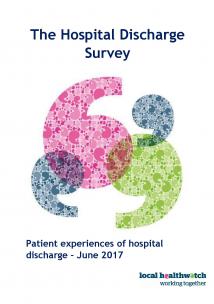Patient experiences of hospital discharge

The aims of the discharge survey were to identify:
• Do patients experience delays in their discharge from hospital? If so, what are the common reasons for this?
• Do patients feel involved in the decisions made about their discharge from hospital?
• Do patients feel that their discharge plan is tailored to their needs?
• Are patients receiving the services that they need following their discharge from hospital and are these services of high quality?
• How do patients feel that their discharge from hospital could be improved?
The findings have been used to highlight areas of good practice and to identify further improvements that could be made.
The following areas of good practice was identified from the information collected through the discharge survey:
• The majority of respondents reported that they felt that they were treated with dignity and respect during their stay in hospital.
• Many respondents from various hospitals reported that hospital staff were caring, kind and supportive. Respondents frequently identified that nursing staff had positively contributed to their stay in hospital.
• 82% of patients at Frimley Park Hospital reported that the time of their discharge was satisfactory and in accordance with their wishes.
Frimley Park Hospital to consider sharing best practice in this matter with other hospitals in the Frimley Health NHS Foundation Trust and with Healthwatch WAM.
Based on the key findings the following recommendations have been made:
• Hospitals should consider reviewing their methods of record-keeping to prevent patients from having to repeat their medical history to hospital staff.
• Hospitals should consider reviewing the way in which they are providing medicine to patients upon discharge, with the aim of discharging patients in a more timely fashion.
• Hospital staff should discuss with all patients, as appropriate, the need for health and social care services after leaving hospital.
• Hospital staff should communicate to all patients their care plan, including any services that they may expect to receive and any services that may not be provided, and ensure that this information has been understood.

